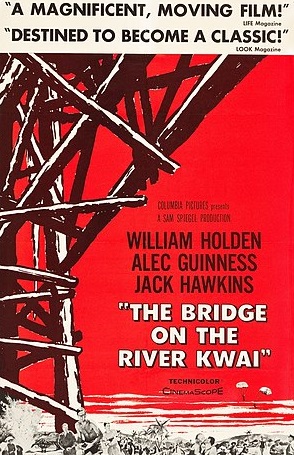
Director: David Lean
Starring: William Holden, Alec Guinness, Jack Hawkins
British POWs are forced to build a railway bridge across the river Kwai for their Japanese captors in occupied Burma, not knowing that the allied forces are planning a daring commando raid through the jungle to destroy it.
I’ve been wanting to see ‘The Bridge on the River Kwai’ for a while. Having seen it now, I’m a bit disappointed. Make no mistake, this is a very well made film, and yes it is a good film; it is just not what I expected.
I think the problem lies in my preconceived idea of what the movie was about. I expected a war movie. This is set during the war, but it is not entirely a war movie. In fact, the first gunshots are only fired around the 1 hour 50 minute mark. That’s a long time to wait for a film running almost 3 hours long. There’s no further gunshots or explosions of any kind until the finale. I suppose in that regard I was disappointed.
But if you don’t have a preconceived idea of the movie and you follow it for the drama it is, you might enjoy it more. I’ve said this before and I’ll say it again: these older films are destined to loose its appeal with newer generations. The new generation likes things faster; and films like these running for almost three hours with quite a bit of talk and little action will bear the brunt.
Prisoners of war lead by Colonel Nicholson (Alec Guinness) arrive at a Japanese camp commanded by Colonel Saito. From the onset there is friction between the two leaders. Saito wants the soldiers to build a bridge over the river Kwai, while Nicholson refuses for his soldiers to do hard labour. The Japanese are building a railway from Bangkok to Rangoon, and Saito is faced with a deadline.
Nicholson finally agrees to help on the condition they design the bridge. Meantime, the British are making plans to destroy the bridge. While an interesting enough premise, I found there to be way too much talk for my liking and eventually became bored. I even found the climax a bit bland.
‘The Bridge on the River Kwai’ was a big success, earning $30.6 million on a $2.8 million budget. It received 37 award nominations, winning 30 including Oscars for Best Picture, Best Lead Actor, Best Director, Best Screenplay, Best Cinematography, Best Film Editing, and Best Score.
Would I watch it again? No.




